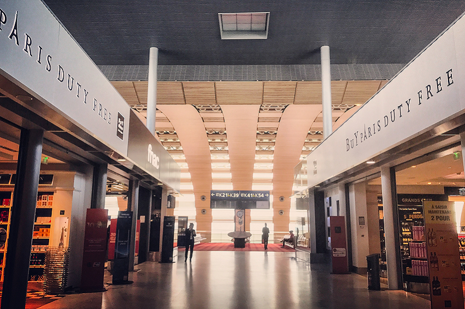
In an interview published on this blog a year ago, our Area Manager for France, Robert Chad, explained the airline sector’s hopes for stronger independent regulation of French airports in order to improve performance and provide value for money for airlines, passengers and air cargo. The Autorité de Régulation des Transports (ART) has now published its findings, and in this interview with Adam Rudny, Assistant Director Airport and ANSP charges at IATA, we explore what these recommendations could mean for the industry.

The ART is an independent administrative authority, which, since October 2019, has had competence for the regulation of airport charges. It has a wealth of experience in regulating other transportation sectors, and a solid understanding of how to regulate when it comes to the strategic level and in technical aspects.
For airports, its role is mainly to approve airport charges according to economic regulation principles. As such, it should aim to protect users and consumers from potentially abusive pricing by airports with market power. However, airlines and the ART are concerned that the system is not working as it should. For example, in the last few years, almost every regulated airport has made use of a legal loophole to avoid having their charges reduced by the regulator. In a recent report on Bordeaux’s airport, the Court of Auditors stated that "while financial resources were accumulating”, there was “an increasing number of worrying signs regarding the performance of its airport facilities: quality of service was declining, and safety and security requirements were being poorly met”.
It's not just the Court of Auditors, airlines or the ART that has concerns. Airport authorities have also complained that the current framework doesn’t provide them with sufficient visibility to plan, nor an environment conducive to finding agreements with airlines.
As a result, the ART has formulated a number of specific recommendations on how to fix the system for everyone’s benefit.
The ART has made four key recommendations. First, the Authority wants to encourage setting charges for multiple years. This is an important first step to moving away from the current “Cost Plus” regulation that is damaging for airlines and passengers. The current system allows the operator to recover costs, and a margin of return on his capital, without any incentive for efficiency.
Second, the ART recommends that at least 50% of extra profits made from shops, restaurants and other activities are used to fund the airport’s operations. This means investors still get a fair return, but that the airport’s investment in infrastructure doesn’t only come from user charges.
Third, the Authority wants to reinforce consultation and transparency between users and airports. It is proposing to change the membership, frequency, and quality of the meetings between airports and their customers. Critically, they also want to review the costs of investment projects at airports, something that is not done independently today. The current framework prevents airlines from getting sufficient information on airports’ financial performance, which means there is little to no room for negotiation. You can’t discuss quality and pricing with an airport without having enough information and enough airlines around the table.
Fourth, the Authority wants to be able to reduce the regulatory burden on airports where appropriate. While undoubtedly major actors like Aeroports de Paris (ADP) will remain strictly regulated, there may be some need to regulate smaller airports differently. For example, the ART proposes only stepping in where there are airport-airline disagreements, as opposed to the current regime where it must review every proposal.
We agree with setting charges for multiple years. It has been our long-standing position. Long term agreements reduce workload, encourage efficiency, and allow everyone to plan. The regulatory framework also plays a key role in financing investments, and must be stable and predictable. Moving to multi-year agreements would also help reduce the use of the aforementioned loophole in the law, which allows airports to increase charges when costs go up, but avoid decreasing for a year if they go down.
On the use of profits from concessions (shops, bars etc, called the “single till”), the ART is right to talk about “extra profits”, i.e., the exceptional return that these businesses make because they are at an airport. In fact, we believe that contribution should be 100%, not the 50% proposed. IATA Economics took historical data in the current model (with a 0% contribution) to estimate the economic impacts of having Paris in dual till as they are today. The estimate is that over 19,000 jobs and around €1.5 billion in GDP have been lost because of the higher charges. Applying a 50% contribution in Paris would help limit the damage by reducing cost pressures that limit airline competition. A “50%” model would still be bad news for France’s regions. From experience and economic impact estimates, a move from the current single till to dual till could result in 30% higher airport charges. That means between 3-5% impact on demand in Lyon, Nantes, Marseille, Bordeaux and Toulouse. A hybrid till would be better, but still negatively impact the economy and demand.
We fully agree with the Authority’s proposal to change how negotiations between airlines and airports work, and to improve representation. For most airports, airlines hand-picked by a local civil servant meet to discuss these strategic topics once a year for a few hours. In those meetings, there’s a formal vote on the airport proposals, but in Paris, for example, the airport gets eight votes, and the number of airlines is limited to four. In cases of disagreement, that configuration is not going to arrive to a balanced resolution.
Every single one of the recommendations benefits passengers. We might not feel some of the recommendations go far enough, but the ART has taken a good first step to ensure a proper economic regulation of airports.
However, it’s not just about passengers. With these changes, airport operators and investors will have a clear framework to work in, and a fair return on their investment. Airlines will also benefit from being consulted in how airports are run, in contrast to today where airlines are informed of decisions after the goose is cooked.
A domestic flight from Paris today includes around €33 in charges and taxes, excluding VAT. Better consultation and efficiency incentives for airports would make existing infrastructure more efficient, all the while providing a smoother experience for passengers. Reduced charges also create room for more competition between airlines and ensure a greater number of routes are more financially viable for airlines, translating into more jobs and economic growth.
There are also benefits for investors. With a clearer and more effective regulatory framework, investors would be more confident that their investments in French airports could produce stable longer-term returns. Airports are low-risk long-term assets. Today, however, we see airports reporting returns on capital of 10% or more, and some airports paying out most of their profits as dividends rather than reinvesting. France is contemplating a tax on long-distance infrastructure that makes more than a 10% net profit. Stable, low-risk investments don’t make those kinds of margins. Implementing the reform means airports could earn reasonable and more stable returns, provided they are run efficiently.
Finally, there are benefits to the French economy. France remains an important actor on the European and global scale, with the country depending on air freight and passenger transport for many parts of the economy including tourism. Stability in the airport sector ensures France’s economy remains connected to the world.
The ART has laid out a clear roadmap of regulatory measures that could be implemented immediately. The French government can implement those with a simple decree. Changes to the law will take more time, but the longer the government waits to put the issue on the table, the worse the current situation will become, and the more the French economy will suffer. Hence, we urge the government to enact these recommendations without delay.
Additional Information: